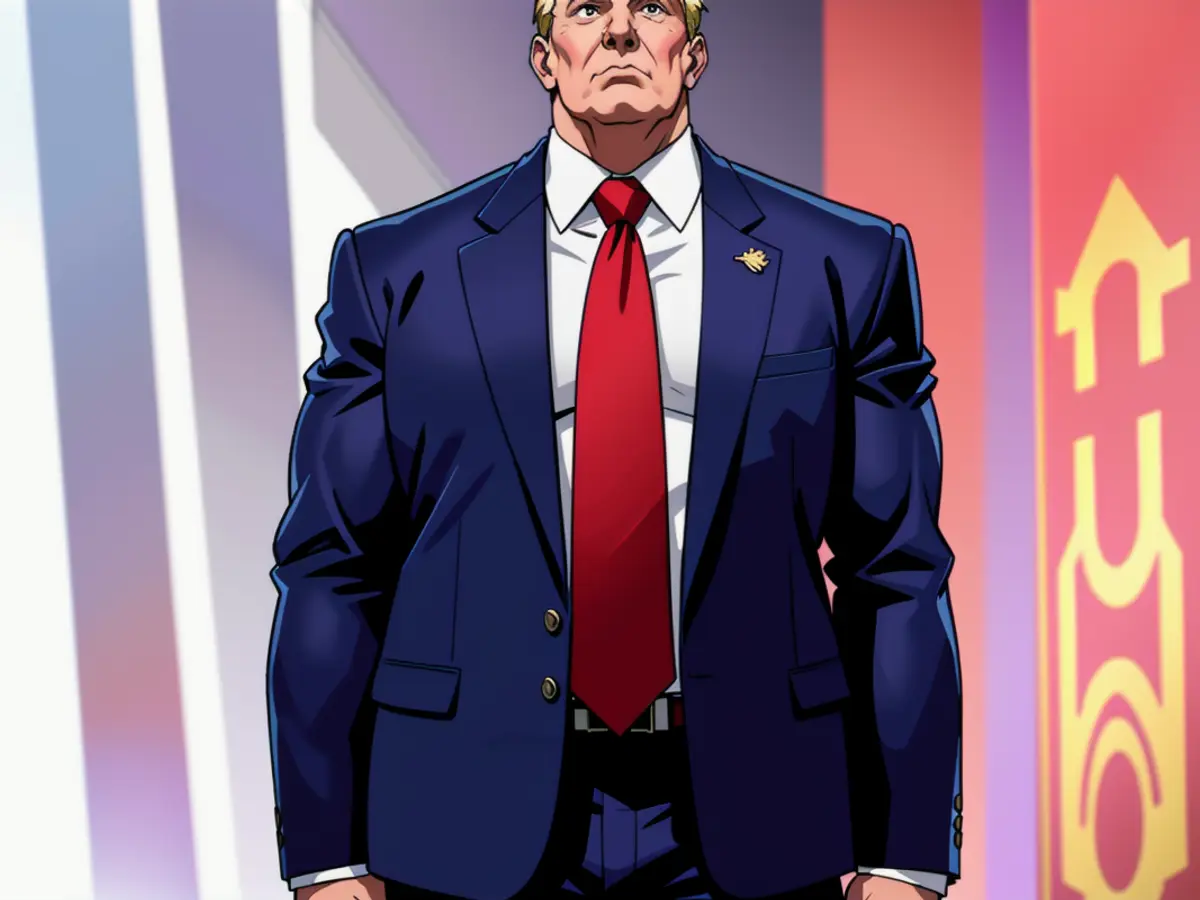Trump's Showmanship: A Strategy Hidden Beneath the Madness?
- By Denny D.
- Approx. Reading Time: 4 Mins
Is there a strategic intent underlying Donald Trump's disorderly actions? - Could Donald Trump's actions be strategically orchestrated turmoil?
Donald Trump's world is characterized by brazen defiance, with an air of nonchalance that leaves many speechless. Take his recent display with Elon Musk and the latest Tesla models in the White House garden - a spectacle that only Trump could pull off. He gazed at the vehicles with childlike wonder, while Musk beamed like a car salesman eager for a sale.
This audaciousness stems from a self-belief that can't be shaken, not even by assassination attempts or impeachments. Many of Trump's supporters view him as a divine messenger divinely destined to save America, with not even the Almighty capable of reining him in. With a Congress and a Supreme Court in his corner, this self-confidence has only grown stronger.
As a result, his policies have taken on a theatrical quality - more akin to improvisational comedy than a well-thought-out plan. One week, he might announce tariffs, only to rescind them the next. Golfing is another weekend staple.
The Impact of Trump's Chaos: US Economy Struggles
On paper, these antics may be entertaining, but in reality, they're causing trouble. American consumer confidence is at its lowest since 2023, dropping by ten percentage points since January. Companies are delaying investments due to uncertainty over future rules. Economists and Wall Street veterans like Mohamed El-Erian are warning about the potential for a recession. New job growth has slowed significantly, and planned job cuts have surged by 250% in February, in part due to layoffs in federal agencies.
Some might say Trump is oblivious to the consequences of his actions. However, it's worth considering if the illusion of chaos and poorly thought-out decisions might be a calculated ploy. At least one paper, written by Stephen Miran, a recent addition to Trump's economic advisory team, suggests this possibility. Dubbed the "Mar-a-Lago Accord," Miran proposals revolve around forcing foreign creditors, primarily Japan, China, and Europe, to restructure U.S. government debt to weaken the dollar and boost U.S. industrial competitiveness. The 1985 Plaza Accord serves as a model for this strategy.
What Does It All Mean?
Trump's true intentions remain unclear, but it's hard to ignore the Mar-a-Lago Accord. Financial experts have been discussing it for months, and even the U.S. Treasury Secretary has expressed some sympathies. Trump himself remains unfazed by market turmoil, casually dismissing the possibility of a recession.
One thing is for sure - the American economy is grappling with Trump's chaotic policies. If Trump is, in fact, following a larger strategy, the consequences could be far-reaching. For now, all we can do is stay vigilant and prepare for what's to come.
Union and SPD's Response to the Crisis
Meanwhile, in Germany, the Union and SPD have accepted the Greens' demand for a larger portion of the planned special funds to be directed towards climate protection. Additionally, this additional funding should not replace existing or new budget expenditures. This stipulation is crucial, as it limits the scope for further spending. Hopefully, this condition will also force the Union and SPD to revisit contentious issues like mothers' pensions and other generous benefits included in their exploratory paper from the previous week.
Beyond Defense Spending and Infrastructure Investments, the next German coalition government doesn't have much on its agenda - given the turmoil in the U.S., they'll have their hands full dealing with the repercussions of the American economy.
Keywords:
- Donald Trump
- Economic Policies
- Stock Market
- Recession
- Debt Restructuring
- Currency Manipulation
- US-Germany Economic Relations
Insights from Enrichment Data:
- There is no evidence to suggest Trump's policies deliberately manipulate the currency or restructure U.S. government debt. However, proposals like the Mar-a-Lago Accord may include concepts similar to past currency manipulations, like the 1985 Plaza Accord.
- Speculation exists about Trump using Bitcoin to alleviate national debt, but this remains unproven and outside the scope of the main article.
- Executive orders allowing greater White House control over federal agencies may indirectly influence economic decisions, although these orders primarily focus on administrative control rather than monetary policy.
- The community policy within the White House remains unclear, as Donald Trump's economic policies, characterized by chaos and improvisation, continue to cause trouble for the American economy, such as decreased consumer confidence, delayed investments, and potential for recession.
- A potential strategy behind Trump's seemingly careless economic policies might be found in the Mar-a-Lago Accord, a proposal by Stephen Miran that suggests debt restructuring and currency manipulation to boost U.S. industrial competitiveness, echoing the 1985 Plaza Accord.
- Meanwhile, in Germany, the Union and SPD are focusing on climate protection and contentious issues like mothers' pensions, noticing the impact of Trump's economic policies on the German economy, as they may be grappling with potential repercussions from the American economic crisis.





